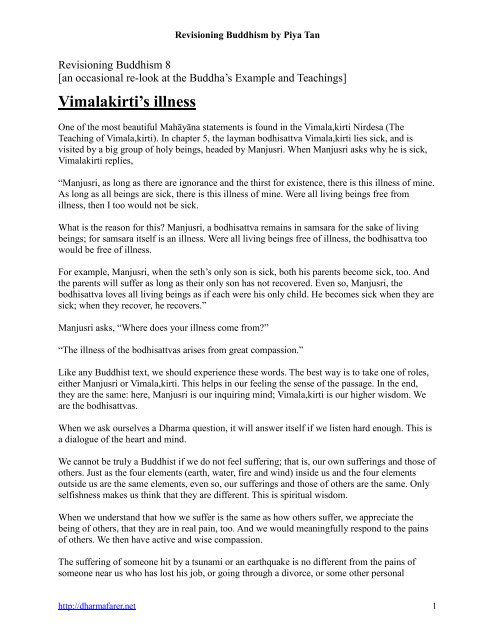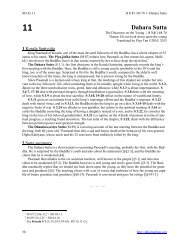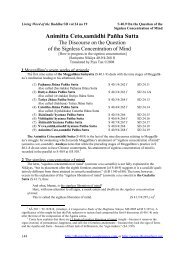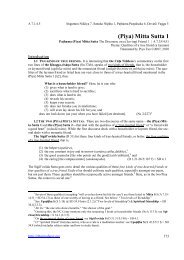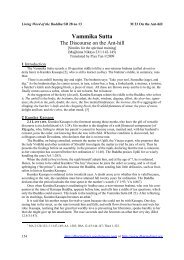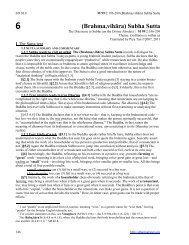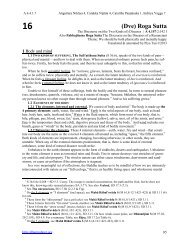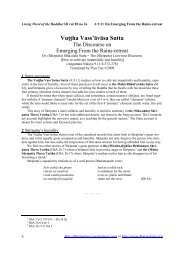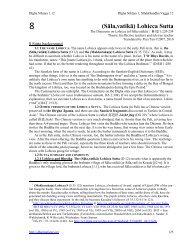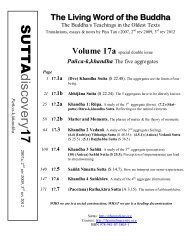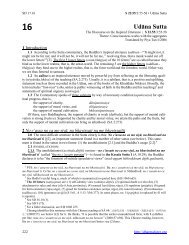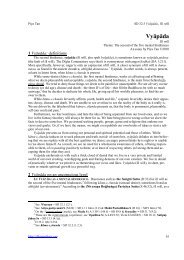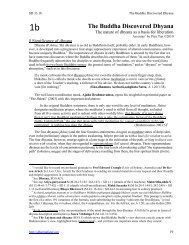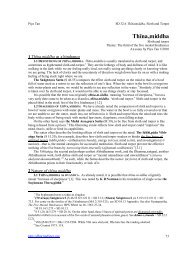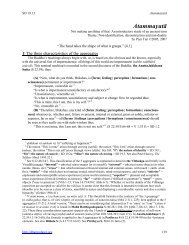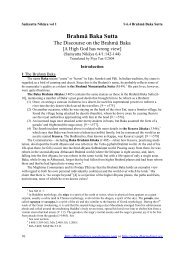Vimalakirti's Illness - The Dharmafarers
Vimalakirti's Illness - The Dharmafarers
Vimalakirti's Illness - The Dharmafarers
You also want an ePaper? Increase the reach of your titles
YUMPU automatically turns print PDFs into web optimized ePapers that Google loves.
Revisioning Buddhism by Piya Tan<br />
Revisioning Buddhism 8<br />
[an occasional re-look at the Buddha’s Example and Teachings]<br />
Vimalakirti’s illness<br />
One of the most beautiful Mahāyāna statements is found in the Vimala,kirti Nirdesa (<strong>The</strong><br />
Teaching of Vimala,kirti). In chapter 5, the layman bodhisattva Vimala,kirti lies sick, and is<br />
visited by a big group of holy beings, headed by Manjusri. When Manjusri asks why he is sick,<br />
Vimalakirti replies,<br />
“Manjusri, as long as there are ignorance and the thirst for existence, there is this illness of mine.<br />
As long as all beings are sick, there is this illness of mine. Were all living beings free from<br />
illness, then I too would not be sick.<br />
What is the reason for this Manjusri, a bodhisattva remains in samsara for the sake of living<br />
beings; for samsara itself is an illness. Were all living beings free of illness, the bodhisattva too<br />
would be free of illness.<br />
For example, Manjusri, when the seth’s only son is sick, both his parents become sick, too. And<br />
the parents will suffer as long as their only son has not recovered. Even so, Manjusri, the<br />
bodhisattva loves all living beings as if each were his only child. He becomes sick when they are<br />
sick; when they recover, he recovers.”<br />
Manjusri asks, “Where does your illness come from”<br />
“<strong>The</strong> illness of the bodhisattvas arises from great compassion.”<br />
Like any Buddhist text, we should experience these words. <strong>The</strong> best way is to take one of roles,<br />
either Manjusri or Vimala,kirti. This helps in our feeling the sense of the passage. In the end,<br />
they are the same: here, Manjusri is our inquiring mind; Vimala,kirti is our higher wisdom. We<br />
are the bodhisattvas.<br />
When we ask ourselves a Dharma question, it will answer itself if we listen hard enough. This is<br />
a dialogue of the heart and mind.<br />
We cannot be truly a Buddhist if we do not feel suffering; that is, our own sufferings and those of<br />
others. Just as the four elements (earth, water, fire and wind) inside us and the four elements<br />
outside us are the same elements, even so, our sufferings and those of others are the same. Only<br />
selfishness makes us think that they are different. This is spiritual wisdom.<br />
When we understand that how we suffer is the same as how others suffer, we appreciate the<br />
being of others, that they are in real pain, too. And we would meaningfully respond to the pains<br />
of others. We then have active and wise compassion.<br />
<strong>The</strong> suffering of someone hit by a tsunami or an earthquake is no different from the pains of<br />
someone near us who has lost his job, or going through a divorce, or some other personal<br />
http://dharmafarer.net 1
Revisioning Buddhism by Piya Tan<br />
problem. Natural disasters happen all the time somewhere on our planet. We tend to be shocked<br />
because of their scale.<br />
If we are truly and wisely compassionate, we understand that the pains of those who have lost<br />
loved ones, homes, and property, are the same as those who are suffering silently in loneliness, or<br />
in illness, or with some problems here in our midst. My point is that the magnitude of suffering<br />
cannot really be compared or measured, even between two individuals.<br />
It is often subjective, that is, it is our bias, that makes us think which people need more help or<br />
which suffering is bigger than another. Maybe we feel more important helping those in bigger<br />
disasters, but those suffering poverty near us are not as important: this is not true compassion.<br />
We should first respond to the pains of those nearest to us because they are within our reach to<br />
help. It would be rather improper if we let those near us suffer, and we go way far out to help<br />
others. As a Malay saying goes: “Milking a monkey in the forest, but our child at home dies of<br />
starvation” (Monyet di hutan disusukan, anak sendiri di rumah mati kelaparan).<br />
Of course, with more of us working together in wisdom and compassion, we can cover a wider<br />
area to help more of those suffering.<br />
All those who are suffering are like our children. This means that if one of our children is<br />
recovering from an accident, and another suffering from a fever, we would still attend to both of<br />
them as if each is our only son. Compassion means never comparing or measuring how people<br />
suffer, but knowing that they are suffering, and responding accordingly.<br />
Nor should we be slow in helping others. For, charity delayed is charity denied.<br />
To have great compassion means to always keep in mind, thus:<br />
“Let no one suffer in my midst! Let no one suffer if I can help it. Let no one far or near suffer! I<br />
will never tell a suffering person, ‘It’s all right.’ Instead, I will ask, ‘Why are you suffering How<br />
can I help’ And I will act on it.<br />
For, my pains arise from great compassion. My pains push me to share and to give. Let me not<br />
give till it hurts, but rather let me give till I cry in joy.”<br />
© Piya Tan, 2009<br />
2<br />
http://dharmafarer.net


